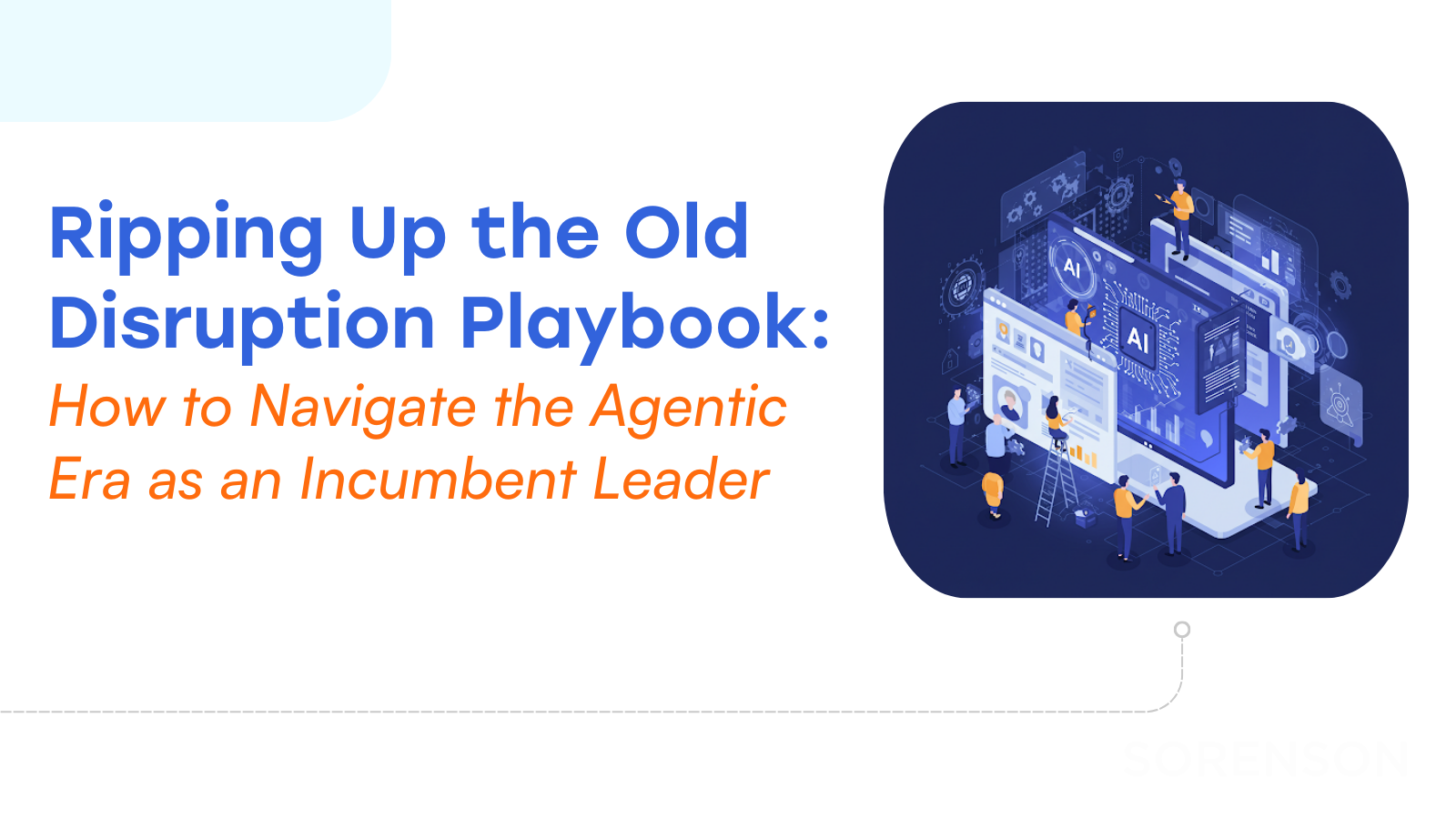
Every major technology shift seems to follow the same, predictable playbook. We watched it with the mobile wave, the rise of cloud computing, and the rise of SaaS. Now, we’re seeing it with the proliferation of agentic AI:
Legacy companies try to put a fresh wrapper on their existing technology, while startups spin up agentic solutions in a matter of months.
It didn’t work when early cloud adopters tried to host their old systems in data centers instead of re-architecting their solution to be cloud native. Eventually, they lost to fully re-architected solutions like Snowflake. Creating the illusion of innovation won’t work now, either. It might be tempting to add ChatGPT on top of your CRM and call your company an agentic solution, but this will only set you back further or leave you open to complete disruption.
The reality for incumbents today is this: If you’re not recreating your product for the future, someone else will create a product that replaces yours. And, they’ll do it faster than you expect.
Embrace Transformation — Not Short-Term Stability
In many cases, incumbents don’t have financial and organizational inertia on their side. The cost of true transformation — that is, investing in a new platform and accepting the temporary dip in profits that come from cannibalizing your existing revenue — is high.
Incumbent leaders who stand to win in the age of AI are the ones who never lost their spirit of innovation. Most entrepreneurs evolve from an innovation mindset into a predictable growth mindset as the company scales, but the ones who are able to go back to the drawing board and innovate again and again are in the best position to stay relevant.
When it comes to case studies, Salesforce often gets referenced as an incumbent that’s responded proactively to the agentic shift, and for good reason. We’ve seen them burn ships and re-architect their platform to stay competitive for over a decade. While other large companies are still growing (for now), Salesforce didn’t wait until they were already feeling the pain of disruption to take action; instead, they have consistently taken a proactive approach to innovation.
This Isn’t a Future Threat. It’s a Current Call to Action
Four out of every five startups I talk to are agentic companies trying to disrupt large vendors. And many of them are succeeding, already gaining market share as they pull customers away from incumbents before those incumbents even see the threat coming.
Though I’ve seen this scenario play out before, I’ve never seen it evolve so quickly. There are countless examples of companies that are accelerating more quickly than incumbents ever imagined. Given the speed of change today, it is imperative for existing software companies to not hesitate to make meaningful changes. With that in mind, there are a few key perspective shifts I’d recommend every incumbent adopt as soon as possible:
- Focus on creating differentiation. AI is already everywhere, and its proliferation is only going to grow. With that in mind, what can your company do to stand out from the rest?
As an example, imagine your company is a CRM for the legal industry. Your first instinct might be to reinvent your company by using agentic technology to read and produce legal documents. Instead, think a step beyond that. What would you build if every legal platform in the world already had those capabilities? Because pretty soon, there’s a good chance they all will.
- Anticipate future customer needs. I often see companies pivot significantly to satisfy large enterprise clients, but that typically comes with a sacrifice to long-term innovation.
Your customers are going to tell you what they want based on the pain points they can see today. It’s your [new] job to build what they’re going to need tomorrow… before they even realize they need it. I won’t sugarcoat it though: Meeting customer demands today while building for the future requires a deft hand and a delicate balance.
- Be cautious of partnerships. The unfortunate reality right now is that partnering with AI startups to accelerate progress tends to be a trap.
Nearly every day, I talk with startups that are sitting on top of traditional CRMs. And every time, they tell me how they’re being friendly with that CRM company for now, while planning to make them obsolete in the next 3-5 years. As an incumbent, you need to have a good handle on how much of your competitive moat could be eroded by “friendly” agentic startup partnerships down the road.
Benchmarking Progress in the Agentic Era
Brady Broadbent wrote in his recent article for incumbent product leaders that are feeling the pressure to keep up: “There’s no reason why incumbents can’t compete in the agentic era if they adapt quickly.” Established companies do have an advantage over startups: a large base of happy customers. Now the challenge is to keep those customers happy by leaning into change.
As companies move full-steam-ahead towards agentic technology, the definition of success needs to evolve, too. Traditional benchmarks like revenue growth and customer retention are no longer enough. Looking inwards, incumbents should continually ask themselves:
- Are we integrating AI in a way that fundamentally changes workflows? Or are we only adding AI features?
- Are we outpacing agentic startups in the value we deliver to our customers?
- Are we proactively building the future of our industry? Or are we just responding to customer requests?
With a thoughtful approach to agentic AI, incumbents don’t have to accept their fate and follow the old, predictable, “technology shift” playbook. Companies that are ready to proactively build, and rebuild, instead of masking their existing technology as an agentic solution can still compete in this new era — and win.




